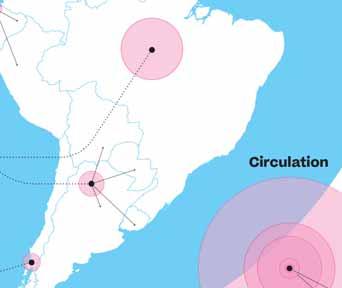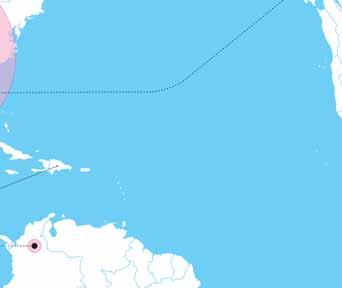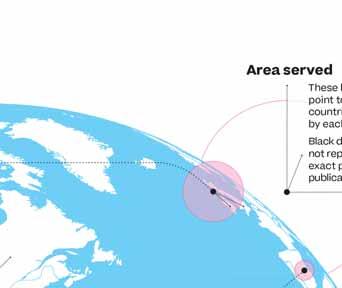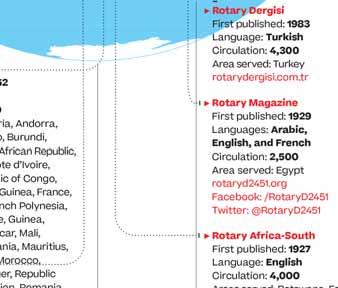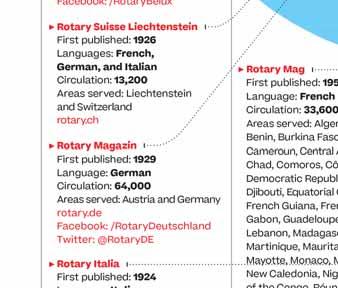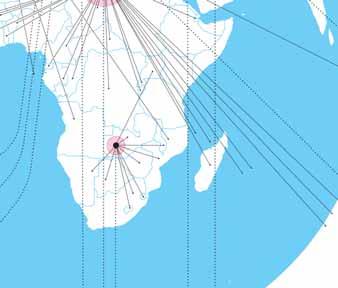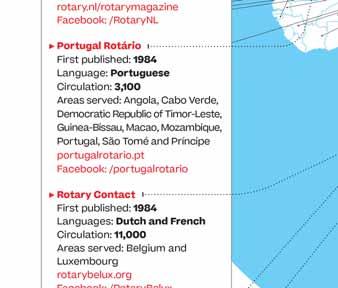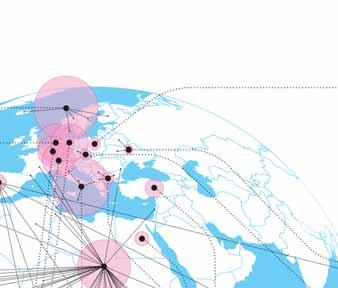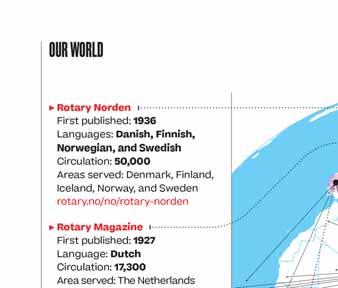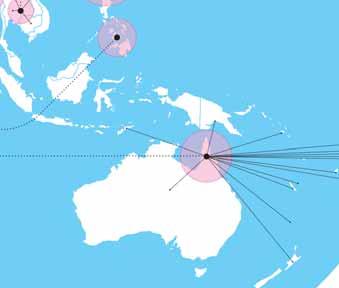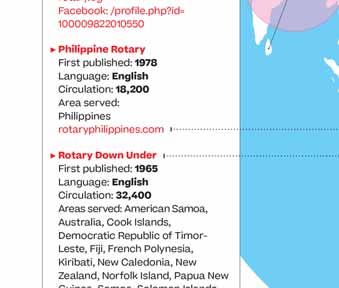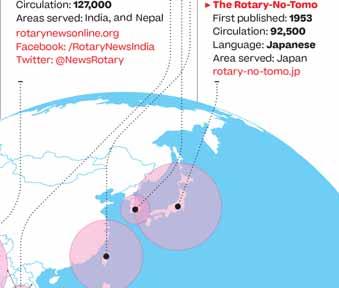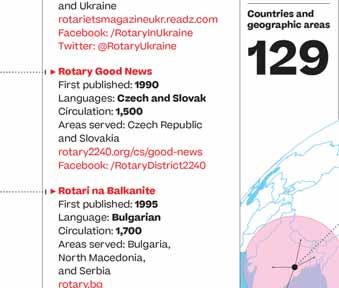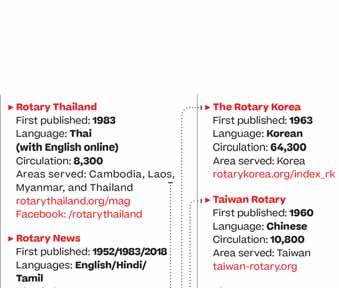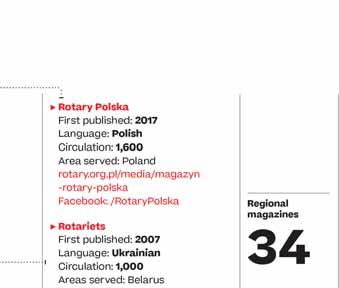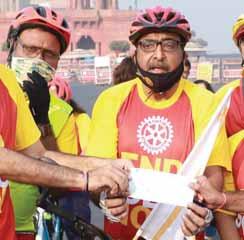
21 minute read
Women Rotarians beat pandemic with novel ideas & projects
Jaishree
The Covid lockdown notwithstanding, a group of four women Rotarians from across the world have created an exclusive platform for women Rotarians to brainstorm and coordinate activities that can transform communities. What began as a casual Whatsapp group by Sharmila Nagarajan of RC Towers Hamlets, London, to beat boredom, has now transformed into a fullfledged Rotary International Women’s (RIW) group which had 251 members across 21 countries by November-end. Sharmila, along with B Dakshayani, RC Chennai Meenambakkam, Vidhya Srini, RC Chennai Temple City, and Denise Kilschan, RC Ibiza, Spain, are the founding members of RIW which was formed in April this year.
Advertisement
Women Rotarians are welcome to join RIW, says Dakshayani. “Our projects are concentrated on Rotary’s seven areas of focus and as a global group we look at activities for the global good. Rotary leaders all over the world have been supportive of our group,” she adds.
RIW has been organising virtual sessions every month. The audience has male Rotarians too who are vocal with their constructive suggestions and appreciation. The July session titled Power Up had RI President Holger Knaack as chief guest where he stressed on Rotary’s diversity, equity and inclusion policy. He called upon clubs to encourage women in leadership positions. “This year we will have
Children learn to make cloth sanitary pads — a project of D 3060 (file photo). six women on the RI Board and during RIPE Shekhar Mehta’s tenure there will be nine, including RIPN Jennifer Jones,” he said.
In this interactive meet, he urged Rotary Action Groups (RAGs) to work in tandem with clubs/ districts in the region as “RAGs support Rotary to achieve its strategic plans and enhance membership.” His wife Susanne shared her journey as a Rotarian since 2014 when she chartered an e-club in Germany. “We started in September and by December we had 14 women and nine men. Now we are 36 members — 11 women and 25 men.” To Vidhya’s question on what would bring more women to Rotary, Susanne said, “ Flexibility,” adding that her e-club is convening meeting at 9pm “instead of the lunch or breakfast meeting that regular Rotary clubs follow.”
Would you be interested to serve as a director for an RAG in your region, asked Vidhya. Susanne’s reply: “For now I am happy to be in Holger’s team. His role is more important now. If his woman is doing another important role, that is not good for
Rotary. We need diversity; not a couple who is doing a lot of things.”
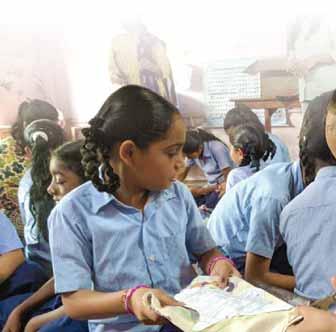

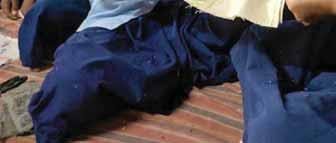
RAG-MHH
On the second Saturday of every month the group discusses women-related issues with a global audience. Menstrual health and hygiene (MHH) was discussed
in one of the meets and thus was born the idea for a Rotary Action Group for MHH. Its registration with RI is under process.
In a recent meet titled Happy Periods, Global WinS Chair PRID P T Prabhakar assured WinS’ support for the group’s menstrual hygiene programmes. “Your RAG is the need of the hour as it will address poor menstrual hygiene which is a bane in most of the third world countries,” he said.
Dr Meenakshi Bharat, member of RC Bangalore West, RID 3190, spoke about the menstrual cup and reusable cloth sanitary napkins. Her suggestion that Rotary should stop investing in sanitary pad dispensing machines and incinerators was well received. She urged Rotarians to usher in a behavioural change in girls and women similar to what is being done for WinS projects.
When Prabhakar said, “This is such a wonderful topic, I wonder why Rotary did not think of it earlier,” on a lighter note Denise commented, “I think there are too many men in Rotary,” and Meenakshi added, “Men can’t think of periods!”
This RAG is open to Rotarians and non-Rotarians and it facilitates sharing best practices from across the world, says Dakshayani. “We have curated a global project on menstrual health to be carried out in 25 countries in May 2021. Next, we will form an RAG for environment protection through RIW. We will have teams to work on the various focus areas.”
RIW has had PDG Bill Gray (RID 7040, Canada), TRF Trustee Geeta Manek and RI Vice President Johrita Solari address their virtual meets. “RIPN Jennifer Jones has also accepted our invitation to address us. We are planning a bigger meet with senior leaders including PRIPs Mark Maloney and Wilf Wilkinson in February in line with the International Service month,” says Dakshayani who is the district director for International services for the year.
RI has set a goal to increase the number of women in Rotary and in leadership positions to 30 per cent by 2022–23 and RIW will work in that direction, she smiles.
Lighting up lives
Team Rotary News
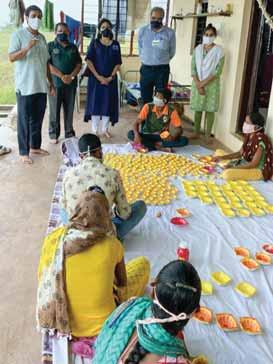
This Diwali the homes of homes of a tribal community livnity living in Saag Pada hamda hamlet near Nashik will shine a lot ine a lot brighter, thanks to RC Nasik, C Nasik, RID 3030, that has provided rovided them an income generating ating opportunity through the the sale of colourful diyas as extensively used to deccorate homes during this his festive season.
Earlier the club president sident Mugdha Lele, secretary Vijay Dinani and past president Anil Sukenkar visited the hamlet and, with Diwali round the corner, decided to train the villagers in painting earthen lamps. “Around 12 men and women were trained in the art. They were excited at the idea of making the diyas and earn some money by selling them,” says Vinayak Deodhar, club member.
The club extended a microcredit of `1 lakh to source the diyas, paints and packaging material and transport the finished products to markets in Nashik, Pune and Mumbai. “We also included boarding and lodging expenses for the craftsmen to stay for a week and sell their ware in the various markets.”
The club has been extending microloans for specific purposes in the last five years through its corpus of `5 lakh and “not once have we faced any default.”
Deodhar is confident that the decorative lamps will fetch a net income of at least `40,000, providing `3,500 to each villager for a week-long work.
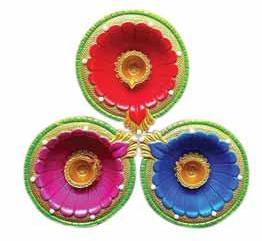
Pandemic relief by Rotarians across India


Bracing up to the Covid challenge, Rotarians across the country have reached out to the frontline warriors, hospitals, health departments, needy families and migrant labourers during the lockdown. As the pandemic raged infecting lakhs of people, Rotary clubs have done Covid-relief projects worth $30 million till October, including setting up Covid care centres, donating equipment, PPE kits and other critical supplies to hospitals and distributing food and grocery kits on a large scale food and grocery kits on a large scale to thousands of needy families. to thousands of needy families.
With hospitals running out of beds With hospitals running out of beds for Covid patients and more people for Covid patients and more people being home quarantined, PDG Dr being home quarantined, PDG Dr
V Muthukumaran
Hariprasad Somani, RID 3132, in consultation with presidents of six Rotary clubs in Latur and district officers including PDG Vijay Rathi and DGE Dr Omprakash Motipawale, supplied oxygen concentrator machines to needy patients at their homes. Many Rotarians donated for the purchase of 11 machines for the project managed by Sudhir Lature and Raj Dhoot.
Latur district collector G Sreekanth and mayor Vikrant Gojamgunde appreciated the efforts of Rotary. “After seeing the response from After seeing the response from patients, Rotary clubs have decided patients, Rotary clubs have decided to purchase more such oxygen to purchase more such oxygen machines for the community,” said machines for the community,” said PDG Somani. PDG Somani.
Project Karuna
RC Belur, RID 3291, donated 6,600 PPE kits, 6,600 N95 masks and 3,300 face shields to the frontline warriors. Karuna - Save our Saviours is a global grant project that has received $47,774 from TRF. A sizeable amount was crowdfunded through social media. The project was conceived by the club’s medical director Anand Agarwal with inputs from his friends — Ayan Sen from Singapore, Monalisa Sen from Belgium, Arpita Chatterjee and Arkadeep Kumar from Chatterjee and Arkadeep Kumar from Australia. “We are thankful to our Australia. “We are thankful to our global partners RCs Singapore and global partners RCs Singapore and Singapore North who played an active Singapore North who played an active role in fundraising,” said Aloke Kumar role in fundraising,” said Aloke Kumar


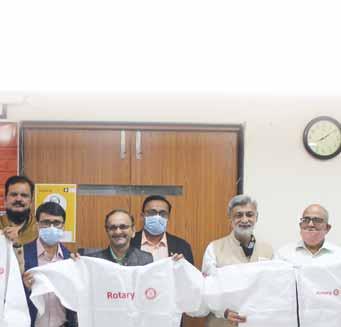
DG Rashmi Kulkarni (L) along with RIDE Dr Mahesh Kotbagi (6th from L) DGE Pankaj Shah (4th from R), DGN Dr Anil Parmar (3rd from L) and PDGs unveiling the PPE kits with Rotary logo.
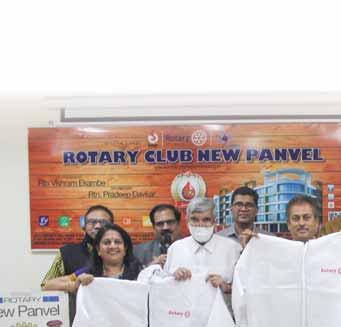

Interact Club of Lakshmi School coordinator Padmaja Rishi donating Covid-relief material to the Madurai corporation commissioner S Visakan.
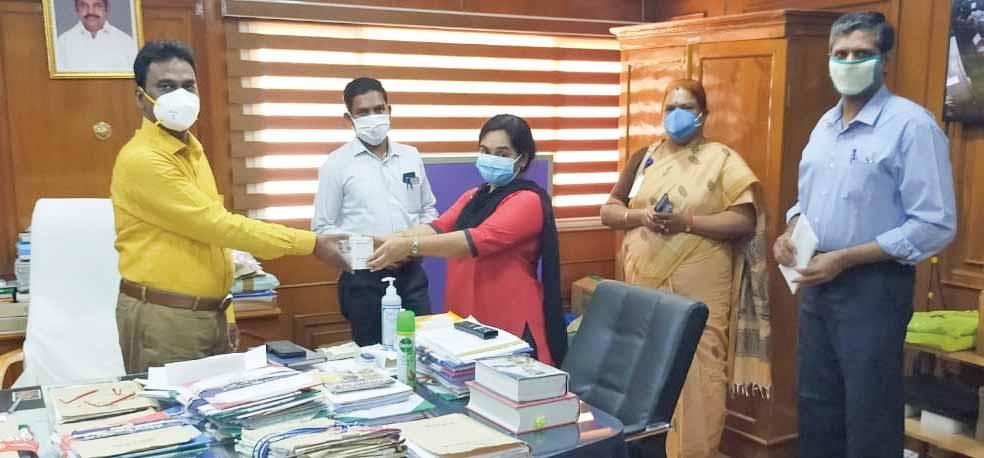
Kanodia, president, RC Belur. DGE Prabir Chatterjee, PDG Ravi Sehgal, secretary Amar Kumar Malhotra and club members were present at the distribution of Covid kits.
RC Calcutta New Alipore, RID 3291, gave smartphones to school girls in a remote village for attending online classes during the lockdown, said club president Ajay Baldawa.
DG Rajesh Agarwal presented three BiPap machines to the Krishna Sarvajanik Hospital under a global grant project for Covid-relief initiatives by RC Himatnagar, RID 3054. DRFC Lalit Sharma, PDG Jagdish Patel and other Rotarians were present at the handover event.
Equipment to Indore Hospital
DG Gajendra Singh Narang, RID 3040, handed over 10 BiPap machines (for infusing air into lungs), 25 nebulisers, 100 oximeters, 500 special non-breathing masks, a coffee vending machine, 25 wall clocks and supportive items for treatment of corona patients at the MRTB Hospital in Indore.
This global grant project was done jointly by RCs Indore Meghdoot and Indore North with RC Kathmandu, RID 3292, as their international partner. RC Indore Meghdoot, the implementing club, is doing Covid-relief projects worth $35,000 to support hospitals treating corona patients. “IPDG Dhiran Datta supported us in this GG project and found the global partner,” said Ghanshyam Singh, IPP of RC Indore Meghdoot.
Over 100 reusable PPE kits with Rotary Wheel emblazoned on it were donated to two charitable hospitals and a dialysis centre by RCs New Panvel and Panvel Central, RID 3131, in the presence of DG Rashmi Kulkarni, RIDE Dr Mahesh Kotbagi, DGN Dr Anil Parmar, DGE Pankaj Shah, RPIC Dr Deepak Shikarpur and district PDGs.
RC Amritsar North, RID 3070, had a project meeting for distribution of PPE kits at the circuit house in the city for the district grant project sanctioned under IPDG Sunil Nagpal’s tenure.
Grocery kits
Grocery kits were donated to daily wagers, migrant families and roadside vendors by Rotary Bangalore Lakeside, RID 3190, through crowdfunding from the residents’ welfare association.
In the first phase, the club reached out to 1,300 families in a migrant colony. As the lockdown stretched, the Rotarians helped another 2,000 families in the eastern and southern parts of Bengaluru, this time with support from the Azim Premji Philanthropic Initiatives (APPI), at a project cost of `14 lakh. “We have been working with APPI in other projects for long and they were happy to partner with us,” said Jayanta Tiwari, club member.
In the third phase, with funding of €22,000 from Freudenberg International, a German corporate, the Rotarians distributed groceries to orphanages, auto drivers, Asha Kiran workers, transgender communities and rag pickers in various parts of the city.
The club partnered with Project Durga, a women’s empowerment programme, and provided ration kits and toiletries to 3,000 more needy people. “We have travelled to around 10 villages spanning 400km from the city in the four months of lockdown,” said Tiwari.
From L: Project co-chair Raj Dhoot, PDG Dr Hariprasad Somani, DGE Omprakash Motipawale, Latur mayor Vikrant Gojamgunde and district collector G Sreekanth.
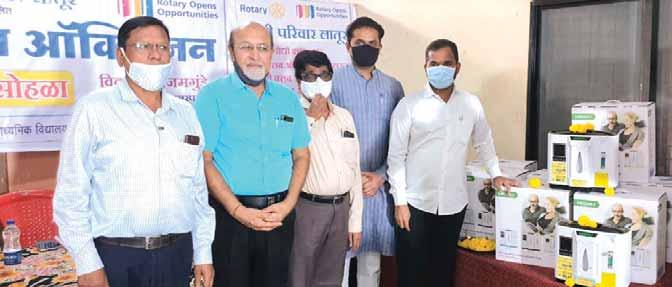
The club is providing medical equipment and PPE kits to hospitals in Victoria, Bowring, Nimhans and Kidwai in Bengaluru, Mysore, Mandya and Kolar. Also, the club is supporting Mercy Angels, a group of volunteers, to perform the last rites of Covid victims.
Special devices to GH, Madurai
To protect children from Covid, RC Madurai North, RID 3000, has donated equipment worth `7 lakh to the children’s division of the Rajaji Government Hospital, Madurai, funded by Smile Microfinance, said IPP D N Govardan.
In a novel fundraiser, the Interact Club of Lakshmi School, Madurai, sponsored by RC Madurai Midtown, RID 3000, organised a digital art competition for students. “The Interactors raised `2.32 lakh with the help of their parents and handed over the money to the Madurai district collector Dr T G Vinay,” said R Srinivasan, Interact advisor. The Interact club also donated Oximeters, PPE kits and furniture to the district collectorate, police commissioner’s office and the district health department.
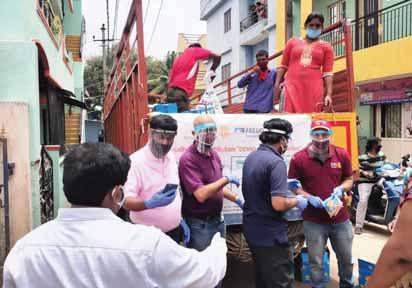
Oxygen line station at Dondaicha
RC Dondaicha Seniors, RID 3060, set up a central oxygen line through which a single cylinder can meet the needs of 12 Covid patients simultaneously. This was installed within 24 hours of the request made by doctors at the Sub District Civil Hospital, Dondaicha. This service, costing `3.47 lakh, helps to avoid or minimise Covid deaths. The club will maintain the oxygen supply network. A swab collection chamber has also been set up at a monthly expenditure of `35,000.
The project was inaugurated by legislator Jaykumar Rawal; DG Prashant Jani, AG Anish Shah, participated in the online inaugural.
With increasing number of patients pushing up the demand of oxygen cylinders, the club has decided to supply five cylinders daily to the Sub District Civil Hospital. The monthly expenditure is `75,000.
Taipei’s facinating temples
When you’re in Taipei for the 2021 Rotary International Convention, June 12–16, take time to visit some of the city’s temples and other monuments. The Lungshan Temple, one of Taipei’s most popular, is primarily Buddhist, but it also incorporates Taoism and Chinese folklore. This ornately carved and painted structure was originally constructed in 1738 and remains an active place of worship. The temple compound is a calming space that includes a small waterfall, fountains and a koi pond.
More than 100 deities are represented in this temple, including the goddess of mercy and the god of war. Students come to pray to Wenchang, the patron deity of literature, before exams, and on matters of justice and honour, people consult Guan Yu, a famed warrior of Chinese folklore. The temple is easily accessible via its own stop on the blue line of the MRT, Taipei’s public transportation system.
Susie L MA
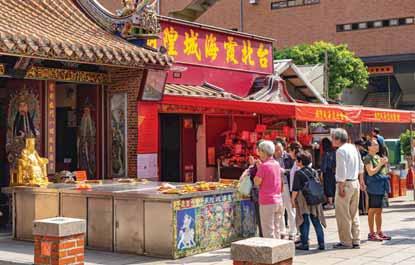
The Xiahai City God Temple is known for its statue of the matchmaker god (pictured), or the “Old Man Under the Moon,” as some call him. This temple is on Dihua Street, home to trendy boutiques and cafes alongside traditional medicinal and artisan shops.
The Chiang Kai-shek Memorial Hall is Taipei’s most prominent historical structure, built as a tribute to the former president of the Republic of China. The hall is part of a complex that includes two performing arts buildings, a large plaza, manicured gardens, and peaceful ponds. You can see the changing of the guard on the hour between 9am and 5pm.
Learn more and register at convention.rotary.org
Apply to serve on the 2021–22 Interact Advisory Council
For the first time in Rotary’s history a group of Interactors and Interact alumni will be able to serve at the international level and advise the RI Board to shape the future of Interact. The Interact Advisory Council will be comprised of eight current Interactors from around the world and two recent Interact alumni as advisers.
Eligibility criteria Interactor applicants must be at least 13 years of age and current member in an active Interact club at the time of application. He/she must plan to be an active Interactor through June 30, 2022.
Interact Alumni Adviser applicants must be a Rotarian, Rotaractor, or an alumnus that was recently (within the past 5 years) a member of an Interact club. Complete the application, including a short video, telling in your own voice why you think you should be selected for the assignment.
The application must be submitted before December 20, 2020. Applicants who are able to communicate in English are preferred.
Council members must participate in 2–3 virtual meetings and collaborate through email while being able to meet your personal commitments to school, family, work, club, etc; be passionate about Interact and have innovative ideas aligned with Rotary’s Action Plan.
Visit http://on.rotary.org/InteractAdvisory Council for more information.
For a successful global grant approval
Utsav R Doshi
Rainwater harvesting facility provided by RC Mumbai Cuffe Parade through a global grant (file photo).
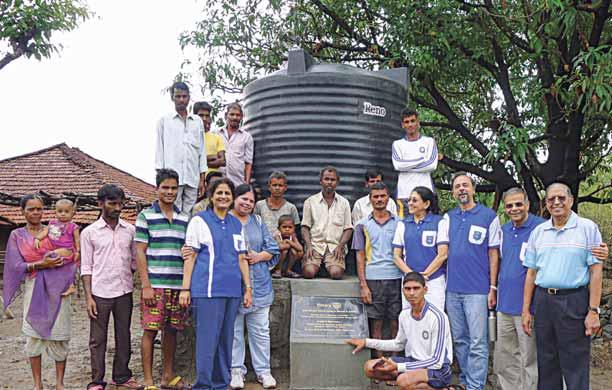
TRF has an extremely credible system of vetting global grant applications. SOPs are followed while receiving applications, before disbursing funds, and while reviewing the implementation. This three-tier filter system has played a role in making Rotary what it is today apropos its transparency, integrity and most importantly the ability to create “living” projects.
Grants may be sampled for audit at any stage of a project. During audit, I often see that not all mistakes are mala fide; mistakes are mainly due to the club members not being well-versed with TRF protocols. The objective of this article is to give precise pointers on things to do and not do for a successful audit. Dos Open a separate bank account for each grant with clear demarcated responsibilities as recorded in the minutes for operating that account. Keep a dedicated file accessible to grant committee members which contains everything, including but not limited to (a) minutes of club meeting confirming the project proposal, community assessment surveys, etc.; (b) stamped bank statements (not the ones downloaded from net-banking); (c) quotations and purchase orders; (d) invoices; (e) minutes of grant management committee meetings (f) print outs of communication done with Rotary and vendors; (g) proof of statutory and regulatory
compliances; (h) payment confirmation receipts; (i) warranty/ maintenance agreements, et al. It is best practice to scan all these documents and upload them on cloud or as attachments in your mailbox. Think of sustainability at all points of time. A toilet block made of gold is useless if the tank remains broken. And likewise, a school bench with one leg off is a burden, not a blessing. One way to keep a project alive is by monitoring it periodically. Form a committee amongst the existing club members to delegate the tasks with close monitoring. Put up a loud and clear Rotary signage at the project site. Every beneficiary walking in must get to read
Rotary’s name. A signage which carries the names of donors, corporates, cooperating organisation, club officials and a tiny Rotary logo will fail to bring out the good work by Rotary as an organisation and its Rotarians. Sign an MoU with the cooperating organisation. It could be in a regional language also which can be subsequently translated by a certified translator. Get inputs from a cadre resource.
RISAO can help in identifying a nearby cadre Rotarian.
Don’ts Don’t give a random beneficiary count in the application. Be realistic. For example, when you say 20,000 patients annually are expected to benefit from a diagnostic centre whereas the fact is that the total number of walk-ins in the entire hospital is 12,000.
Hence achieving that count for the diagnostic centre per se would be impossible. Don’t procure goods or services from club members or their relatives unless that is warranted, absolutely necessary and thoroughly disclosed to every single person in the grant management committee as well as to the Rotary officials. Don’t finalise a vendor unless 3-5 quotations are received for the same set of goods or services. Don’t make large value payments in cash; make the vendor agree to transacting via banking mode.
Remember even a farmer has a basic bank account these days. Don’t take the requirement of training for granted, this is a must for any successful project. Don’t seek credit of funds from the
Foundation when there is a delay in project execution.
I hope this article helps you to bid adieu to your cadre auditor barehanded, with an empty slate of observations but a happy heart. I thank the cadre chair, stewardship staff and fellow cadre colleagues for their valuable inputs.
Disclaimer: The scope of this article is limited to the words it can print. At all points of time, notwithstanding anything contained herein, kindly stick to TRF guidelines for grant compliances. Different types of audit have different requirements; the items mentioned here are a mere guidance to project’s financial audit post facto.
The writer is a global grants technical coordinator – financial audit.
Adivasi women in Jabapanposh and other villages surrounding Rourkela are learning to cultivate mushrooms for their livelihood, thanks to the initiative of RC Rourkela Steel City, RID 3261. “Life has been hard for the villagers. Covid had taken away their jobs and they could not go out to seek work,” says club secretary Annabelle DeSouza.
Gouri Nag, the project co-chair, is in mushroom cultivation and with support from
Tribal women learn mushroom cultivation
Team Rotary News
Project co-chair Gouri Nag teaching mushroom cultivation to women in Jabapanposh village.
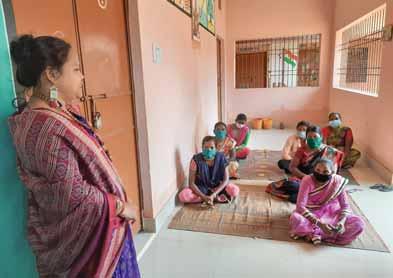
club president Suchismita Biswas, she has trained to grow oyster mushrooms. The local Food and Safety explained the procedure to maintain cleanliness and hygiene. “As Western Odisha lacks an agricultural research centre to supply at subsidised rates, we will provide the seeds to the SHGs,” says Annabelle. She is confident that each family can earn at least `100 daily from the vocation and “we will also help market the produce in our circles.” Project Chairman Kumar Behera is working with the government to support the women.
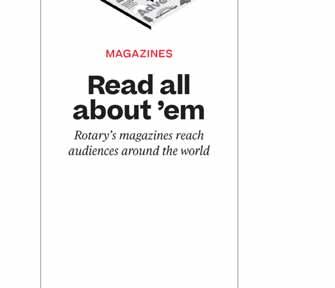
Rotary launched The National Rotarian, a magazine for its members, in 1911. Since then, we’ve undergone two name changes, to The Rotarian in September 1912 and to Rotary in September 2020. As the Rotary movement spread across the globe, members from other parts of the world began publishing magazines of their own to spotlight local Rotary stories; there are now 34 regional magazines in 25 languages serving members in 129 countries and geographic areas. Rotary’s magazines provide a direct link between Rotary International and each of its members, sharing news and information and inspiring readers with stories of people of action. In honour of this magazine’s 110th anniversary, here’s a look at the scope of all of Rotary’s magazines.


Compiled by Donna Cotter
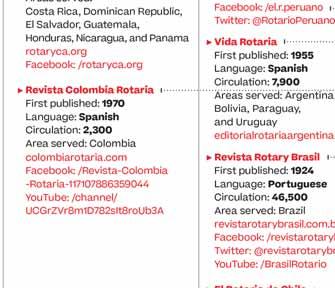
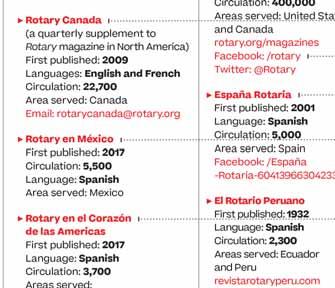
Extra, extra As part of a pilot programme, Rotary Russia is published as a digital-only magazine serving Chechnya and Russia. And in Venezuela, where makes subscriptions prohibitively expensive, Revista Rotaria continues to publish for a limited readership.
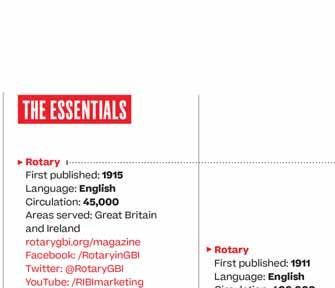
(Rotary News Trust (RNT), India, also brings out a quarterly issue of Rotaract News which is mainly a digital publication. RNT believes this is the only Rotaract magazine that is published by a regional Rotary magazine.)


